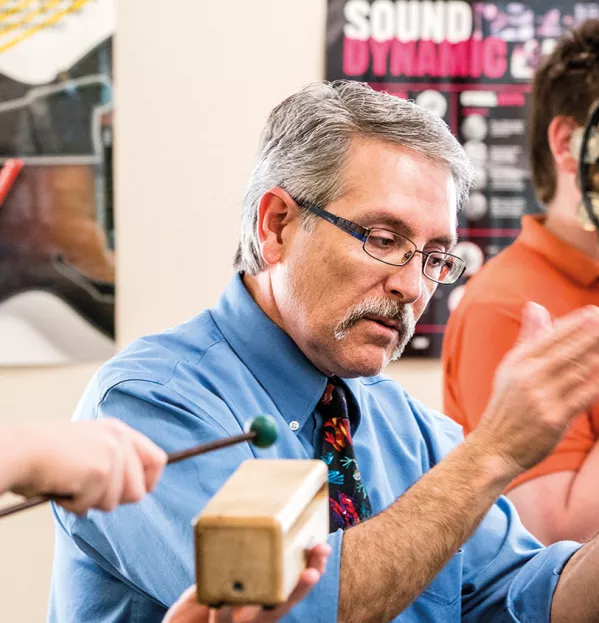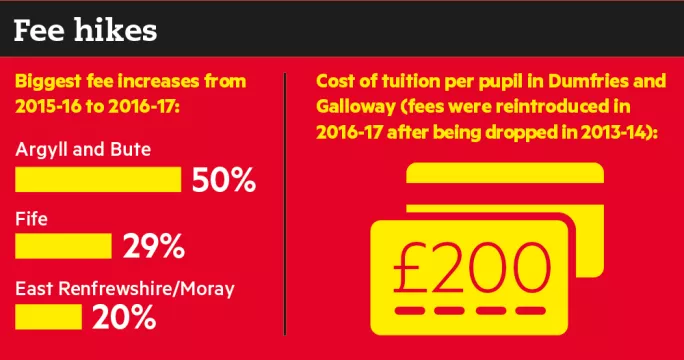Patchy instrument tuition funding strikes a bum note

The patchy funding of instrumental tuition around Scotland means that children are being denied the chance to learn skills of huge benefit to their overall attainment, according to education leaders.
The criticism comes as evidence has emerged of variation in the availability of instrumental lessons and large tuition fee hikes.
A report has revealed that “very few” councils meet demand from pupils as things stand, and budget reductions could have “significant implications” for the number able to receive instrumental music lessons.
However, the situation varies markedly around Scotland, according to the report by local government organisation the Improvement Service.
Strings attached
Midlothian, for example, scrapped fees in 2016-17, whereas Dumfries and Galloway reintroduced them - at £200 a year - after previously offering free tuition.
Argyll and Bute hiked fees by 50 per cent compared with last year, while East Renfrewshire has had the biggest long-term rise - 87.5 per cent since 2012-13.
The proportion of pupils learning an instrument also varies markedly, from nearly a quarter of the Western Isles’ primary and secondary roll (22.9 per cent) to only 6.8 per cent in Clackmannanshire.
And with big differences in the number receiving concessions or exemptions from fees - ranging from 74.6 per cent in Inverclyde to 11.5 per cent in Argyll and Bute - there are concerns that many talented young people will miss out.
Kirk Richardson, convener of the EIS teaching union’s Instrumental Music Teachers’ Network, said: “There is a huge disparity across Scotland in the range of fees being charged, and there seems to be no rationale or formula as to how increases are calculated - or, indeed, justified.”
The Improvement Service found that, in Scotland as a whole, there was an increasing focus on providing equal access to all pupils. But Mr Richardson said that there was a “middle squeeze”, meaning families who were struggling financially but did not fit into standard measures of poverty often missed out.
‘There seems to be no rationale or formula as to how increases are calculated - or, indeed, justified’
“As the fees gradually increase, tough decisions have to be made,” he added. “And, more often than not, bright pupils can be lost to the instrumental music service and music in general.”
He reiterated his network’s concerns that cuts could be “catastrophic” to instrumental music in Scotland, as it was a discretionary service that provided “low-lying fruit” every time a council was looking for savings.
“I believe the service will survive, but in what shape or form I’m not sure,” he said.
Maureen McKenna, president of education directors’ body ADES, agreed that there was “inequity” in instrumental music because it was not a compulsory service in schools, with many pupils drawn from “socially mobile” families.
Research published earlier this month by University of Liverpool academics suggested, contrary to other studies, that it was unlikely that music training could reliably enhance children’s academic achievement.
But Ms McKenna said that, in her authority, Glasgow, music had high status. “We believe that music contributes strongly to raising attainment - we have got good research evidence that you can link that to the rhythm of music, and that it improves motor skills and literacy,” she added.

Vocal support
Glasgow has made the most of “voice” as a type of musical instrument: the authority’s heavy emphasis on choirs means that pupils do not have to get hold of an expensive instrument. And success in choirs could often create a stepping stone to playing instruments, said Ms McKenna. It also had the advantage of encouraging teamwork more than predominantly one-to-one tuition.
Eileen Prior, executive director of the Scottish Parent Teacher Council, said that she regularly heard from families concerned about the “postcode lottery” of instrumental music tuition. She called for parents to have a greater say in determining the priority given to music by each local authority.
A government spokesman said: “Local authorities are responsible for the delivery of education and for meeting their own local circumstances and needs.
“As part of our commitment to tackling inequality, the Scottish government is supporting Sistema Scotland to help tackle inequalities in some of the most deprived areas of Scotland, and has maintained the £10 million for the Youth Music Initiative, both of which provide music opportunities for children and young people across Scotland.”
You need a Tes subscription to read this article
Subscribe now to read this article and get other subscriber-only content:
- Unlimited access to all Tes magazine content
- Exclusive subscriber-only stories
- Award-winning email newsletters
Already a subscriber? Log in
You need a subscription to read this article
Subscribe now to read this article and get other subscriber-only content, including:
- Unlimited access to all Tes magazine content
- Exclusive subscriber-only stories
- Award-winning email newsletters